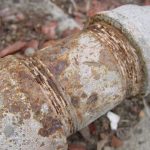Many people have returned from a long trip or vacation and turned on their hot water faucet only to find that the water is rust colored. Usually, within a minute the
hot water returns to a normal color after the water in the pipes has been released. If the faucet is delivering discolored rusty water on a daily basis whenever it’s turned on, this is a different problem. Let’s look at this phenomenon in more detail and examine some common causes for rusty hot water.
Corroded Iron Plumbing:
The water discoloration could indeed be rust that is coming from corroded galvanized iron plumbing pipes and fixtures. This is often the case if you live in an older house that has an older galvanized iron plumbing system. This problem is not encountered in modern homes that usually use a combination of copper and plastic pipes. Over time the corrosion will only get worse, and pinhole water leaks may occur. The best option here would be to replace the old pipes with a more modern alternative.
Municipal Water Issues:
The problem may not be related to anything that’s occurring in your water heater or plumbing system. The city water supply can be affected by disturbances or other public works that are being carried out in your neighborhood. This theory is easy to test, simply run the cold water faucet in another part of your home. If this water is also rust colored the problem is probably a municipal water issue, you can relax, your water heater is probably fine.
A Buildup of Sediment:
Over time sediment could buildup in your water heater tank and then enter the water coming from your hot water faucet. The sediment will change the color of the water and give it a discolored rusty appearance. This usually occurs because there has been a break in the underground pipes that bring water into your home. The best way to deal with this problem is to get a plumber to flush out the water tank to get rid of the sediment. Then it’s a good idea to enroll in a maintenance program to prevent a recurrence.
An Older Water Heater:
It could be the case that your aging water heater has reached the end of its useful life. One of the final signs that a water heater is failing is discoloration in the water indicating corrosion. The dirt, rust, and corrosion in the water tank are beginning to override the water heater, and failure will occur shortly. When the water heater finally fails, it cannot be repaired, and a replacement will be needed. There are a lot of models of water heaters available to suit many different types and sizes of homes.
A local plumber will be happy to offer impartial advice on which water heater would suit your needs best and then professionally install it for you. If your old water heater served you well, there may be an updated version available that could be easily fitted.
By Giovanni Longo President Flood Brothers Plumbing
Giovanni Longo is a 3rd generation master plumber who has been practicing his craft and trade in the greater Los Angeles area for well over a decade and a half. A plumbing and hydraulics-engineering innovator, Giovanni’s particular world-class expertise focuses on dealing with challenging sewer system designs as well as resolving complex commercial and residential draining issues. As a certified Flood Mitigation expert, he is also well versed in a wide variety of water damage and remediation solution.





